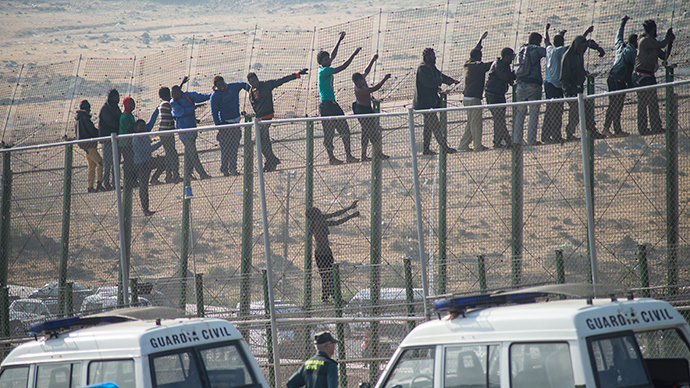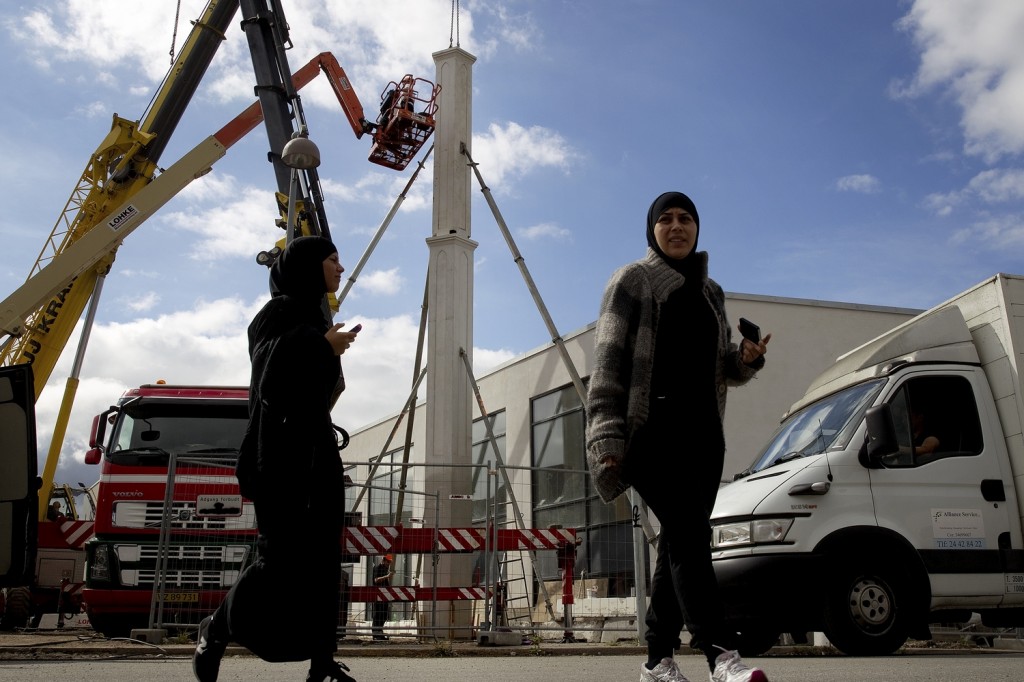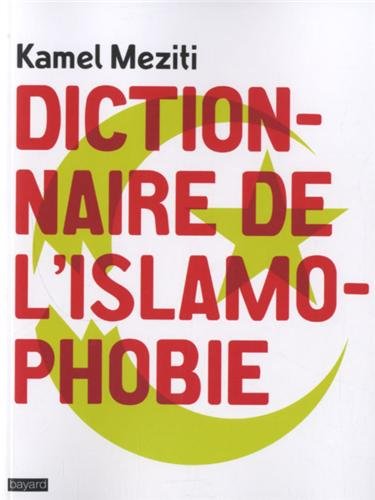A Survey of Islam in Europe: September 2013
From Britain to Greece, and Spain to Slovenia, Muslim immigration and the accompanying rise of Islam are transforming the European way of life in ways unimaginable only a few years ago. What follows is a brief survey of 20 noteworthy stories involving Islam in Europe during just the month of September 2013.
A Survey of Islam in Europe: September 2013
Soeren Kern | Gatestone Institute | October 9, 2013
From Britain to Greece, and Spain to Slovenia, Muslim immigration and the accompanying rise of Islam are transforming the European way of life in ways unimaginable only a few years ago. What follows is a brief survey of 20 noteworthy stories involving Islam in Europe during just the month of September 2013.
In Britain, the Department of Education revealed that is recruiting former agents of the British secret service, MI5, to investigate the alleged infiltration of British schools by Islamic extremists. The agents will form part of a new counter-extremism unit, established to investigate schools in which radical activity has been suspected. Speaking to the Sunday Times on September 29, Education Secretary Michael Gove said some schools are being “taken over” by Muslim hardliners in the hope of radicalizing pupils and staff. He also said he was determined to “weed out” schools whose practices do not conform to British values.
A survey published by the BBC on September 25 revealed that more than a quarter of young British people distrust Muslims and feel Britain would be better off if there were fewer of them in the country. Of the 1,000 young people questioned in the survey conducted by ComRes, a leading market research agency, 27% of 18-to-24-year-olds said they did not trust Muslims, while 28% said Britain would be better off with fewer Muslims. It also emerged that 60% thought the British public had a negative image of Muslims, and 44% said Muslims do not have the same values as the rest of the population.
A separate survey published by Lord Ashcroft Polls on September 1, showed that six in ten Britons thought immigration had produced more disadvantages than advantages for their country; only 17% thought the pros outweighed the cons. The biggest concerns were about migrants claiming benefits or using public services without having contributed in return.
Elsewhere in Britain, a judge on September 16 ordered a Muslim defendant to take off her full-face veil to give evidence in court. But—in a case that made legal history—he said the woman could retain the veil for all other parts of her trial. Judge Peter Murphy said the court should recognize “freedom of religious expression,” but that allowing her to retain the niqab during her evidence, as she wanted, would “drive a coach and horses through justice administered in England and Wales for centuries.” Murphy said “the niqab has become the elephant in the courtroom” and there was widespread anxiety among judges over how to tackle the issue. He added that he hoped “Parliament or a higher court will provide a definite answer to the issue soon;” and that “If judges in different cases in different places took differing approaches [to the niqab] the result would be judicial anarchy.”
In other news, a total of 186 Muslim inmates at three different prisons are suing the British government, claiming their human rights were violated after tests confirmed that halal food being served to them contained pork meat. A total of 11,248 Muslim prisoners make up 13.1% of the jail population in Britain. The legal cases come amid fears of a growing “culture-of-being-compensated” among prisoners. More than £60 million (€71 million; $97 million) was paid to criminals, prison staff and visitors to British jails over the past four years for prison-related incidents.
On September 12, the Birmingham Metropolitan College reversed a ban on Islamic veils after Muslim students complained of discrimination, and launched an online petition drive that gathered more than 8,000 signatures in just two days. The college backed away from its ban just hours before a mass demonstration by hundreds of Muslim students threatened to disrupt the normal functioning of the college.
In Denmark, construction crews in Copenhagen raised the country’s first-ever minaret on September 3. The 20-meter (65-foot) tower-like structure that will alter Copenhagen’s low-rise skyline is the finishing touch on a colossal project to build the biggest mega-mosque in Scandinavia. The so-called Grand Mosque, which will cater to Sunni Muslims, was made possible thanks to a 150 million kroner ($26 million) donation from the Persian Gulf Emirate of Qatar. This gift has led critics to voice concerns that the mosque will become a mouthpiece for radical Islam in Denmark.
In France, a new “Dictionary of Islamophobia” published on September 13 systematically takes the words and expressions spoken by politicians, journalists, intellectuals, artists and writers in France and claims to show how “Islamophobia is becoming commonplace today.” Each entry in the 366-page dictionary provides the context and an explanation of the offending words. The book calls for vigilance to advance the concept of “living together.”
In Germany, the state of Lower Saxony on September 30 signed a preliminary “state treaty” with local Muslim representatives to recognize Islam as an official religion. The document addresses 30 specific grievances presented by the Muslim community, which constitutes around 7% of the overall population of the state. According to the minister-president of Lower Saxony, Stephen Weil, “A mutual skepticism has occurred in the past and our government wishes to show its respect to the Muslims with this treaty.” Similar “treaties” have recently been signed in Bremen and Hamburg.
Also in Germany, judges at the Federal Administrative Court in Leipzig on September 11 ordered a Muslim schoolgirl to take part in mixed-sex swimming lessons. Her parents had insisted that the girl, 13, not take part in swimming lessons at her school in Frankfurt because she felt “uncomfortable” going swimming with “bare chested” boys near her. She either wanted to be allowed to skip the lessons or be given special instruction on her own. The court ruled that the “social reality of life in Germany came above her religious beliefs,” and ordered her to attend swimming lessons wearing a full-body-covering garment known as a “burkini” in order to accommodate her beliefs.
Meanwhile, a dispute in Berlin over efforts by multiculturalists to ban Christmas was resolved on September 19 after Mayor Klaus Wowereit stepped in to declare that Christmas is still legal. A row erupted after the left-leaning Green Party in the Kreuzberg district of Berlin announced that the traditional Christmas markets that have taken place in the neighborhood for generations would henceforth be held under the religiously-neutral term, “Winterfest.” Muslims make up roughly one-third of the population in Kreuzberg. Wowereit said he had received complaints about the ban from angry people all across Germany and said the dispute had harmed Berlin’s reputation.
In Greece, Infrastructure Minister Michalis Chrysochoidis on September 17 announced the fourth auctioning of the project for the construction of a taxpayer-funded mega-mosque in Athens. The three previous competitions to build the mosque in the Votanikos area of Athens took place on July 9, 18 and 26 but failed to attract suitable bids after some companies say they had received threats from groups opposed to the mosque. Critics of the mosque say Athens, which is being kept afloat by an international bailout, cannot spare the one million euros ($1.4 million) it will cost, considering that Greece is in a sixth year of recession, with record high unemployment and sinking living standards.
In Iceland, the Reykjavík City Council on September 19 approved a building permit for the construction of the first mosque in the country. Members of the city council — which is led by Reykjavík Mayor Jón Gnarr, who identifies himself as an anarchist — say they hope the prime location will make the mosque a prominent landmark in the city. Critics of the mosque, however, say the project is being financed by donors in the Middle East who are seeking to exert control over — and radicalize — the growing Muslim community in Iceland.
In Italy, Mohammed is now the most common name among small business entrepreneurs in Milan, the country’s main industrial, commercial and financial center. According to a new report published by the Milan Chamber of Commerce on September 3, more companies were established over the past twelve months by men named Mohammed than by those named Joseph (second place) and Marco (third place). Mohammed also outnumbered other traditional Italian names such as Giuseppe, Luca, Andrea, Roberto and Antonio. This development — a reflection of the broad changes taking place in Italian society due to mass immigration — marks the first time that Muslim business owners have displaced native Italians from the top spot of the annual list of company startups.
Meanwhile, the United Nations Refugee Agency said, on September 13, that nearly 6,000 Syrians have arrived in Italy so far this year, a massive spike from 369 refugees in 2012. On September 25, three boats carrying more than 700 asylum-seekers landed on the Mediterranean island of Lampedusa, the southernmost point of Italy and a major gateway for illegal immigration into the European Union. On September 14, the Italian Coast Guard said it rescued 800 migrants (here, here and here) in three different vessels off the coast of Sicily. On September 7, the Italian Coast Guard intercepted another 700 asylum-seekers off the coast of Syracuse.
In Slovenia, Muslims laid the foundation stone of the country’s first mosque in the capital Ljubljana on September 14. Construction of the mosque is expected to begin in earnest in November and is projected to take three years at a cost of some €12 million ($16 million). Around 70% of the construction costs are being paid for by, again, Qatar. Slovenia, a mostly Catholic country of two million people, has a Muslim population of 50,000.
In Spain, an annual report published by the Attorney General’s Office on September 19 says that radical Islam is gaining in strength in Spain, and warns of a “high risk” of jihadist-inspired terrorist attacks. The report says Spain is repeatedly mentioned in online jihadist websites, and is the focus of irredentist claims to Al Andalus, the Arabic name given to those parts of Spain, Portugal and France that were occupied by Muslim conquerors (also known as the Moors) from 711 to 1492.
Also in Spain, police on September 16 arrested Yassin Ahmed Laarbi, the alleged ringleader of an Al-Qaeda jihadist network recruiting fighters for the war in Syria. Laarbi, alias Pistu, was arrested in Ceuta, a Spanish exclave in northern Africa. He is believed to be the head of a cell of eight men who were arrested in a police operation on June 21. At the time, Laarbi successfully eluded police. The network was engaged in recruiting, indoctrinating and facilitating the movement of dozens of Islamists to training camps and war zones, particularly in Syria. Spanish police say they have evidence that dozens of jihadists traveled from Ceuta and Morocco to Syria with the help of this network.
Meanwhile, hundreds of migrants stormed the Spanish border with Morocco on September 17, in the latest in a wave of thousands of migrants trying to reach Spain. Around 300 migrants tore down part of the six-meter (20-foot) high fence around Melilla, a Spanish exclave bordering northern Morocco, and about 100 made it through. In a separate incident, another 350 migrants tried to reach Spain’s other North African territory, Ceuta, by swimming to one of its beaches from a nearby Moroccan shore.
In Switzerland, Ticino became the first Swiss canton to approve a ban on face-covering headgear in public places, following a vote on September 22. Just over 65% of voters in the Italian-speaking canton voted in favor of the change to the law. The Ticino initiative did not explicitly target Muslims — the phrasing voted on was, “nobody in public streets or squares may veil or hide their face” — but in practice it means women in Islamic burkas and niqabs.
Soeren Kern is a Senior Fellow at the New York-based Gatestone Institute. He is also Senior Fellow for European Politics at the Madrid-based Grupo de Estudios Estratégicos / Strategic Studies Group. Follow him on Facebook and on Twitter.
Link to Original Article: http://www.gatestoneinstitute.org/4004/islamophobia-dictionaries






